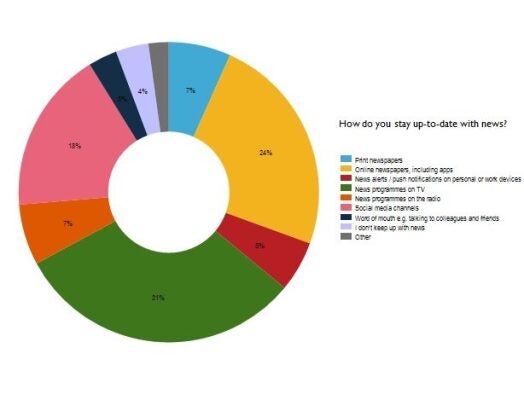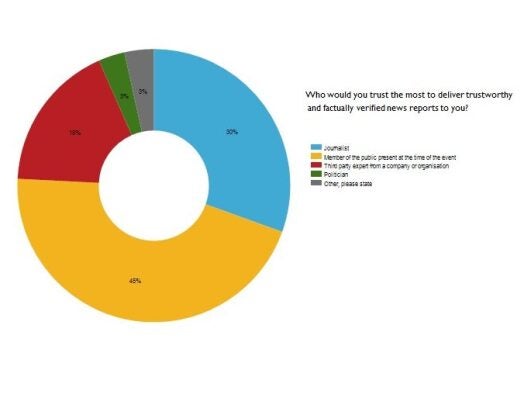
A new survey has suggested that print is the least popular medium when Britons are asked to give one answer to the question “how to you stay up to date with news”.
The poll, commissioned by video agency Newsflare and carried out by Morar Research, asked 2,000 about their news consumption habits.
Asked “how do you stay up-to-date with news?” most respondents (31 per cent) said TV news, followed by 24 per cent who said online newspapers and 18 per cent who said social media channels.
Only 7 per cent said print newspapers.

Source: Newsflare/Morar Research
But, when asked “which type of media do you think is most likely to provide trustworthy and factually-validated information?” 61 per cent said broadsheet newspapers were the “most important”.
More than half (52 per cent) said national broadcasters were the most important, while just 12 per cent of respondents said this of tabloid newspapers. Social media content shared directly by publishers was said to be most important by 4 per cent of those surveyed.
More than half (51 per cent) of those surveyed said they were “more likely” to engage with a news story if it included images or video footage captured by a member of the public. When asked why, the majority (42 per cent) responded that “it is footage taken in real time at the scene”.
Video and imagery taken by a member of the public make 36 per cent of participants more likely to trust the media platform, while 28 per cent said that statistics and data made them more likely to trust the platform.
Newsflare co-founder and chief executive Jon Cornwell said: “It’s both promising and worrying to see the scale of mistrust in the UK media.
“While it goes a long way to positively demonstrate the freethinking, self-influential world we now live in, recent reports of fake news have clearly changed the public’s opinion about whether media content is genuine and reliable. Instead, people are swaying towards user generated content.
“Eyewitness video is powerful not only because it’s a real time account but because it is able to prompt an emotional response, which is particularly effective in a socio-political context.
“Video has the power both to build audiences and to build trust. However, publishers and broadcasters must avoid taking shortcuts when it comes to verifying eyewitness video.
“A video and its filmer leave a complex digital footprint, which if properly understood and investigated, can guarantee a video’s authenticity before it is published or broadcast to support a news story.”
Ninety-six per cent of respondents said they checked the news regularly.
When asked, “who would you trust the most to deliver trustworthy and factually verified news reports to you?” 30 per cent said a journalist, while 45 per cent said a member of the public present at the scene.

Source: Newsflare/Morar Research
On the issue of fake news, 42 per cent said of those surveyed said they had recently seen or read a piece of news that they did not believe to be true. Of these, 73 per cent said they doubted the overall legitimacy of the news source in question as a result.
Picture: Shutterstock
Email pged@pressgazette.co.uk to point out mistakes, provide story tips or send in a letter for publication on our "Letters Page" blog

